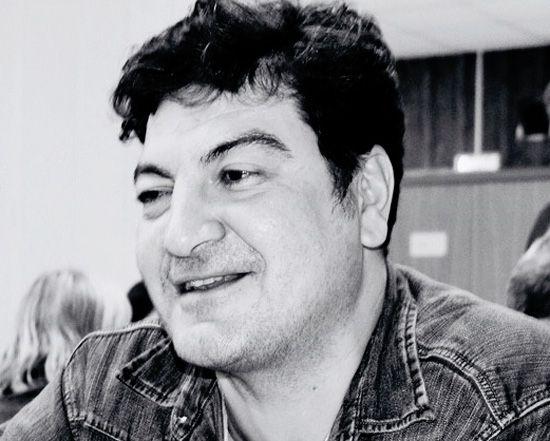Interview with film historian and film publicist of Echo.Az, member of Russian Guild of Cinematographers and Film Critics
—What do you think about the state of cinematography in Azerbaijan today?
—Everything is better than a situation where there is a lack of creativity in crisis and mental level. Nevertheless, success was achieved in the independent cinema of Azerbaijan - for example, in the person of Teymur Daimi, who had been successful in many film festivals during the last year, as well as Kazanski, whom I mentioned in my interview with your newspaper.
I am waiting for Teymur Hajiyev`s work next year, because he is the person I am particularly proud of. I was his first teacher on the history of the world cinematography and taught him Eisenstein's theory of montage. Over the past 10 years, he has been moving towards the first feature film in his profession. Particularly, I would like to note that Teymur has several master classes in top film festivals around the world. I think that this is a serious matter for the future.
—And what is known about the films of students?
—Practically nothing at the moment. But I look forward to the results of the course films of the studio created by the well-known film director Vagif Mustafayev in the Institute of Culture. When I was at the Russian State Institute of Cinematography, I met with Vladimir Malyshev, the rector of the legendary cinema school, and learned about several other compatriots who were preparing for a diploma film.
—How much is the Azerbaijani cinematography integrated into the processes of world cinema?
—To be honest, let's say, at present, our cinema is somewhere in the periphery of a serious commercial cinematography. There are many reasons ... here includes a lack of interest in self-improvement in working on oneself, insufficient awareness, poor implementation, i.e. internal self-improvement, inclusion of world trends - not necessarily Western ones - in our national cinematography and our surroundings being far from positive creativity. For 25 years, the contact with the cinema screen and audience hall lost. Today, the audience has returned to the cinemas, but not to art-house movies, to the local low-quality trash-movies. There is nothing to list, because all of them are slags of a damaged incubator.
If there is a 5% viewers of the so-called thinking public still remain as a subspecies, it certainly brings optimism that not everything is lost, because the remaining 95% seems to be satisfying, or no one wants to demonstrate at least some alternative.
But after all, the films of Tarantino and Scorsese, who by some miracle broke through into Baku cinemas, were sold-out. Since the 90`s, there has been the East-West film festival movement, but over time it has discredited itself, having turned into a banner of cinema, and thus undermined the state's credibility in this kind of cinema forums.
As a result, Ibrus Film Festival failed everything that was self-confidently entrusted to them by the mission of enlightening the spectator and promotion of Azerbaijan. The fact that Baku, staying at the junction of the western and eastern civilizations, was left without a film festival - this in itself is nonsense. But who else was supposed to do that other than us? But it turned out that the cinematic initiative “Silk Way” was realized by Kazakhstan, our eternal neighbor.
The fact that Baku, staying at the junction of the western and eastern civilizations, was left without a film festival - this in itself is nonsense, to whom, if not to us? But it turned out that the cinematic initiative “Silk Way” was realized by our eternal neighbors from Kazakhstan.
The film festival is an integral attribute of the urban culture of the population. Without film festivals, there is simply no way to break through, even in Afghanistan there are already two film festivals functioning. In the post-Soviet space only Azerbaijan and Turkmenistan exist without any film forums. Hopefully, in 2018, we will be able to come back to this topic several times. This is my wish to Santa Claus.
— What was memorable for you about this year?
—I have been the Chairman of International Jury of the Competition for Documentary Film Contest in Kazan Film Festival for the first time. Among the festivals, the invitation to “Beliye Stolby” (“White Pillars”) film festival of the State Film Fund of Russia is especially significant. I would say without false modesty that this invitation was to some extent, recognition of my status as a film historian of the State Film Fund of Russia. My search for the phantom film “Kaspiytsy” (1943), made by Grigoriy Aleksandrov, and produced by “Azerbaijanfilm” film studio was finally crowned with success. The film was shown in the repertoire of 2017 and aroused lively interest as a sensational finding!
—And further?
—Details of the results of this finding can easily be found in the search network of the World Wide Web. My research is published under the title of the publication “The Cinematheque of a Centenary with the “Life of the Caspian” («Синематека столетней выдержки с каспийской «дорогой жизни», представленное в академическом издании сайта «Гильдии киноведов и кинокритиков России») (Kinopressa.ru) presented in the academic publication of the website of the Russian Guild of Cinematographers and Film Critics.
In addition, this text was re-published by the very popular mass network resource, “Private Correspondent” («Частный Корреспондент»). By the way, without modesty again, I would like to note that this article included in the most popular articles in chaskor within a few days. The point is that how the “historical fact” is in fact can suddenly turn out to be just a confectionery product for the unintelligent spectator and it remains like that for over 70 years!
As an example, I can say that when the time changed, when yesterday's idle idols collapsed on the floor, it seemed that yesterday's steady foundations and propaganda stamps - these or other facts can be completely desacralized or demythologized.
— Have you participated in the project to create a new film encyclopedia as a film historian and one of co-authors?
—This is one of the most important events in my life, since I am the first one to have a chance to embrace the history of Azerbaijani cinema over the past hundred years. Indeed, that chance appears once in a century! In fact, this is only in the form of an encyclopedia, but in content it is the work of a collective monograph by a group of writing authors consisting of cinematographers and film critics. The texts are not based solely on primitive information and statistics, the main thing is that the authors were given a chance to enrich the chronicle of the film history with literary content. Readers can decide how and to what extent the experiment should be obtained.
The publication of the monograph was arranged on the date of “The History of National Cinematography in the USSR and the Perspectives for the Development of Cinema and Cinema Education in the CIS Member States, Baltic States and Georgia” International Scientific-Practical Conference. All three days of productive disputes took place in the new building of the All-Russian State Institute of Cinematography named after S.A.Gerasimov. The original author of the idea is the cinematographer Elena Stishova, thank to her I once got on the pages of the academic magazine “The Art of Cinema”.
The main organizer of both the publication of the monograph and the conference itself was the New Institute of Cultural Studies of the Russian Federation with the support of the Intergovernmental Foundation for Humanitarian Cooperation of the CIS Member States (IFHC). I express my special gratitude to the administration of the Institute, in the person of Kirill Razlogov and Nina Kochelyayeva, doctors of art criticism for joining me to the project and their unconditional full support for my authorship with complete freedom of choice both in form and content of the final text of my topic “Azerbaijan cinema in search of centennial self-identification”.
İ.ASADOVA




